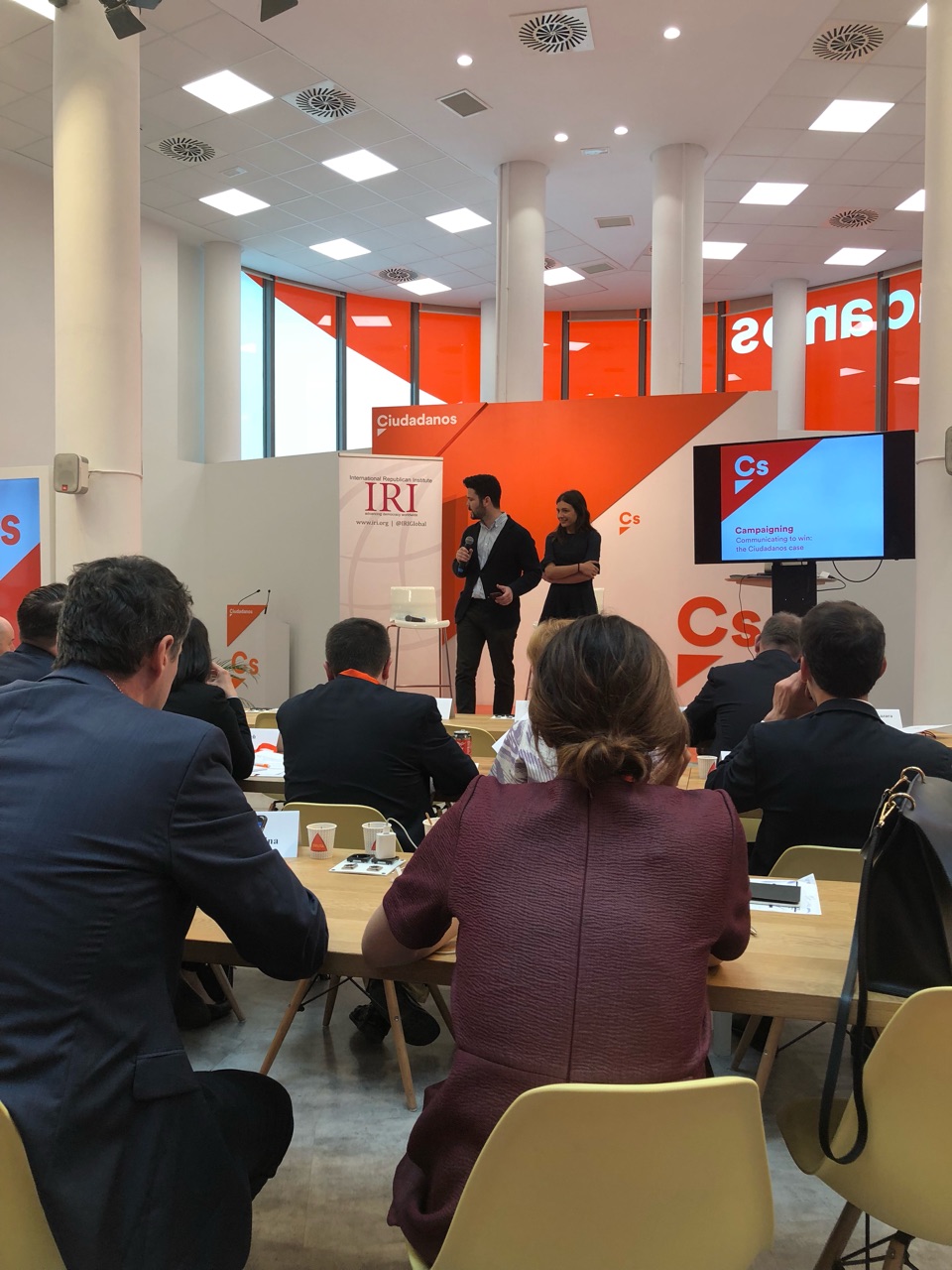For two days in May, IRI and Ciudadanos (Cs), the Spanish center-right party, hosted the Emerging Parties Summit in Madrid. The Summit brought together 25 leaders and campaign executives from 15 recently formed parties in 11 European countries.
Despite a common commitment to the transatlantic relationship and to democratic values, the participants represented a patchwork of different European political affiliations. Even though most participants were predominantly liberal in the European sense (i.e. committed to small government, despite a division between “social” and “classical” liberals), Christian democrats and conservatives were also represented.
It was important for these groups to come together as they face similar challenges by nature of being founded at the national level less than ten years ago. These parties are the product of the socio-electoral changes that have swept the European continent since the financial crisis of 2008, and the inability of the old catch-all parties to adapt to the changing demands of new sections of the electorate. In a political system that is much more fluid than in the United States, parties can quickly rise to power and then promptly disappear, creating a political vacuum.
Anti-systemic (“populist”) parties have been the first to emerge, but the continued mismatch between the old “big tent” establishment parties and a changing electorate has created another vacuum that new parties are trying to fill – some of them with astonishing success, as Emmanuel Macron’s election showed last year in France.
The “start-up” nature of these parties, to quote Summit participant and author of the upcoming book “Political Entrepreneurship: How to build successful political startups,“ Josef Lentsch, creates common challenges. First, various party leaders, many of whom come from civil society, struggle to accept their new status as a political party. Running a political organization differs drastically from running a company or a civil society organization. By sharing their experiences with each other, emerging party leaders can understand their new environment and appreciate their aspiration to represent sections of society that are otherwise underrepresented.
This leads to the second major challenge. In order to become institutionalized in the political environment, emerging parties must create an internal local and national structure. Many emerging movements have found this difficult to do, particularly as their first raison d’être is the rejection of traditional politics and traditional parties.
Finally, all these parties, even the most successful ones, face a major communication challenge as they struggle to find an identity beyond the fact that they are new. Once new parties become official, they learn that being the “new kid in town” is a very temporary phenomenon. To firmly take root in national politics, these parties need to define themselves beyond their novelty to be easily identifiable by their potential electorate.
After reading this, you may ask, “Why would an organization like IRI invest in these young parties, knowing full well that – in true start-up fashion – only some will rise?” The answer is linked with the state of democracy in Europe – which, let’s face it, is not good. Despite their unpopularity on both sides of the Atlantic, political parties are vital to a working and thriving democracy.
Political parties represent the different aspirations of society. One of the main reasons for Europe’s democratic crisis is that the old party system no longer seems to match the aspirations of different sections of the electorate, creating a dangerous apathy that can in-turn allow extremist and anti-democratic forces to fill the vacuum. Investing in political start-ups is a way for IRI to encourage a positive renewal of democracy that can engage citizens who, until very recently, have not seen their interests represented by the political class. Including these new electorates in the political process is crucial to reinforcing the resilience of European societies against their own weaknesses as well as from malign foreign influence.
Knowing that our political party work was vital, we took special consideration in picking the location of the Summit and who we partnered with. We decided Spain would be the best place to host as Ciudadanos has many similarities to the participating emerging parties. Spain has been at the forefront of the massive electoral changes on the continent. Their old bipartisan system was swept away in the matter of a few years allowing for a four-party system, plus regional parties, to emerge.
This is where our co-host, Ciudadanos, emerged. Cs first entered the Catalan parliament as a regional party in 2006 with three votes and three seats. In 2014, it expanded to a national party, running in the European elections and obtaining two seats in parliament before breaking through the glass ceiling to obtain almost 14 percent of the vote in the 2015 parliamentary elections.
Ciudadanos has progressively resolved all of the above-mentioned challenges to build an incredibly disciplined and efficient party structure over the years. The party was able to create a clearly defined identity based on free markets, the safeguard of the Spanish union and transparency. This structure has allowed the party to potentially win key races in the country’s major cities during the upcoming local elections and take first place in next year’s European election. A win like that could open the doors for their leader Albert Rivera to enter government in the general elections set to take place before July 2020.
The rise of the Cs is truly remarkable and is due to the patient work of Cs’ leaders and staff who truly built an electoral machine. Other emerging parties certainly have a lot to learn from the progressive development of Ciudadanos.
It was because of Ciudadanos that the 2018 Emerging Parties Summit was a real success. The political party not only initiated experience-sharing, but also made all participating political leaders think about their parties differently and create a long-term plan for their parties. Cs’ involvement offered a unique lens for emerging parties to visualize their long-term progression. The Emerging Parties Summit as a whole supported a robust democratic renewal in Europe led by young, new parties.
Top